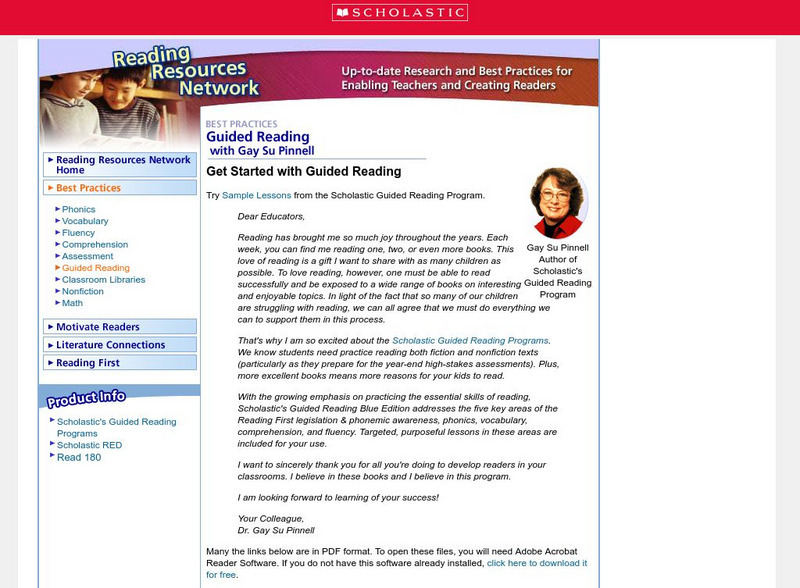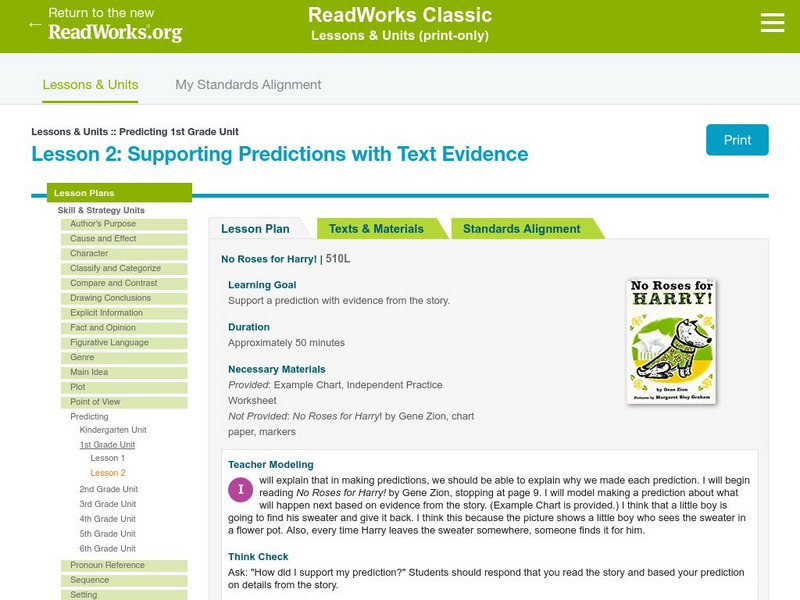Curated OER
Alliteration
Students write and illustrate a sentence which names a letter of the alphabet. The sentence should have subject, verb, describing words, and incorporate alliterative techniques.
Curated OER
Technology-commected Folklife Lesson Plan: Fables
Students discuss ways the stories were alike and different. The teacher demonstrate how to draw a Venn diagram using Microsoft Word. They label the two circles and enter the likenesses and differences on the diagram.
Curated OER
Don't Use it All Up
Learners observe the way that a sponge absorbs liquids and discuss how we our use of natural resources affects the environment around us. They discuss the need to conserve resources so we don't run out of what we need.
Curated OER
Nursery Rhymes
Pupils recall details of nursery rhyme read by teacher, identify main characters, and demonstrate knowledge of poem by creating concept map about story that includes title, clip art, and changes in font and color.
Curated OER
Feet Are Neat
Students describe several types of bird feet and explain how each type helps a bird survive in its habitat. Students then match birds to their feet and mold bird feet out of clay.
Curated OER
Feelings
Students learn how to express their feelings. In this language development lesson, one student reads a sentence off a sentence strip and another student responds with "I feel...". The class discusses why the student feels that way and...
Curated OER
Hero Or Zero?
Students investigate science and technology by reading a children's book. In this reading comprehension lesson, students read the story Archibald Frisby and discuss the ways we use science and technology in everyday life....
Curated OER
Harriet Tubman: Dancing on the Freedom Trail
Learners observe a dance interpretation about Harriet Tubman. In this art/social studies lesson plan, students explore how their emotions can be expressed through movement and create their own dance or dramatic interpretation.
Curated OER
What's For Lunch? A Combination Sensation!
Students combine different foods to make possible lunches and determine the specific combinations of lunches that can be made from a finite set of foods.
Curated OER
Sound
First graders investigate sound and recognize the importance of hearing. They listen to and identify sounds in the environment, classroom, and on a pre-recorded tape. The students classify each type of sound and participate in a Sound...
Curated OER
Producing Heat
Students listen to "Heat Wave" by Helen Ketterman and discuss the story by creating a word web with heat as the main topic. They break into groups and conduct an experiment using a thermometer to record the temperature of melting ice...
Curated OER
Old friends, New game
Students create characters from a book. In this Language arts lesson plan, the students act out the story by role playing. The students learn how to articulate correctly, by working together to arrive at the same...
Curated OER
What Are Mixtures And Solutions?
Students explore mixtures and solutions. In this chemistry lesson plan, students will add different ingredients to jars in order to classify them as mixtures or solutions. There is also a nail balancing activity that can be done at...
Curated OER
Reading Strategies for Elementary Students
Students practice using strategies to help them read. They participate in activities that help them sound out words and determining the main idea. They also examine good and bad reading habits.
Curated OER
Cooler in the Shadows
Students explore how the amount of sunlight and heat change in areas that are shaded.
Curated OER
Wanted Poster
Students examine a fairy tale character of their choice in great detail. They create a wanted poster that includes the following: a picture of the character, a written description of his/her appearance, a reward amount, and reasonthe...
Curated OER
How Can You Detect the Invisible?
Students participate in a lab activity in which they examine the characteristics of radon. They identify radon's link to cases of lung cancer. They complete a radon fact sheet and answer questions to end the lesson plan.
Curated OER
A Chance of a Life Time
Young scholars view and discuss the painting A Narrow Escape, by Alfred Jacob Miller. They write their own narrative about a time they were either scared or frightened. They make sketches of that time and choose one to paint using...
Better Lesson
Better Lesson: Using Word and Picture Clues to Make an Inference
First graders will use text evidence to make inferences about word and word phrase meanings in a text. Word and picture clues will be used to help students form inferences.
Better Lesson
Better Lesson: Introduction to Making Predictions and Inferences
First graders will engage in a shared reading of "Mr. C's Dinner" so that we can build a foundation for understanding what it takes to make good predictions and inferences.
PBS
Pbs Learning Media: Molly of Denali: A Splash of Mink Lesson Plan
In the animated 11-minute story "A Splash of Mink," from the PBS KIDS series MOLLY OF DENALI, Molly and Trini must find a remedy after being sprayed by a mink. Despite getting advice from various sources about how to get rid of the...
PBS
Pbs Learning Media: Molly of Denali: Dream Tube Lesson Plan
Use this comprehensive lesson plan as part of a comprehensive literacy, STEM, or social studies unit in which children will be using informational texts. In the "Dream Tube" animated story from the PBS Kids series Molly of Denali, Molly...
Scholastic
Scholastic: Getting Started With Guided Reading
How do you get started with guided reading? At this site one can find the answer to this question. The online lesson plans will help get students started with guided reading.
Read Works
Read Works: 1st Grade Unit: Supporting Predictions
[Free Registration/Login Required] A lesson utilizing the book No Roses for Harry! by Gene Zionin in which students make a prediction and then support it with details from the text. Ideas for direct teaching, guided practice, and...
Other popular searches
- Teaching Inference Skills
- Inference Skills First Grade
- Reading Inference Skills
- Powerpoint Inference Skills
- Inference Skills in Reading
- Inference Skills Worksheet
- Science Inference Skills
- Inference Skills Sixth Grade






















